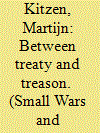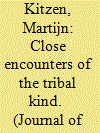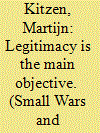| Srl | Item |
| 1 |
ID:
109956


|
|
|
|
|
| Publication |
2012.
|
| Summary/Abstract |
Recent counterinsurgency experiences in Iraq and Afghanistan have demonstrated that the local operating environment often is dominated by indigenous power-holders. As counterinsurgents seek to establish control over the local population, collaboration with these agents has become an essential aspect of contemporary counterinsurgency. Although the practice of constructing collaborative relationships with indigenous power-holders might be perceived as unconventional by today's counterinsurgents, the approach itself goes back to the colonial era in which modern counterinsurgency has its roots. This article explores the dynamics, benefits, and dangers of collaborative relationships with indigenous power-holders by analysing an infamous episode in Dutch colonial history, the case of the collaboration between Dutch colonial authorities and warlord Teuku Uma during the Aceh War (1873-1913). This relationship ended in disaster for the Dutch as Uma departed their side at the moment he had become their pivotal asset in the local political landscape. The article explains that the Dutch succeeded to co-opt Uma, but failed to control him as they lacked the will and means to do so. Furthermore this case study provides an insight in the way the Dutch colonial authorities dealt with the complex process of intelligence-gathering in a fragmented indigenous society.
|
|
|
|
|
|
|
|
|
|
|
|
|
|
|
|
| 2 |
ID:
115219


|
|
|
|
|
| Publication |
2012.
|
| Summary/Abstract |
In contemporary counter-insurgency campaigns de-escalation is typically achieved by obtaining the local population's collaboration. The rationale underlying this approach is that such collaboration spawns control over the population and therefore weakens the insurgent's position. This article seeks to understand how this approach is practised in the reality of contemporary counter-insurgency warfare. In Iraq as well as Afghanistan counter-insurgents were confronted with fragmented indigenous societies in which the various local segments were dominated by local power-holders. Consequently, obtaining the local population's collaboration required co-option of these agents. As such a strategy of co-option is a highly localized approach, this article focuses on Afghanistan's Uruzgan province and analyzes the implementation of co-option by the Netherlands' Task Force Uruzgan (TFU), which operated there from 2006 to 2010. The analysis discusses how the counter-insurgents obtained a profound understanding of Uruzgan's societal landscape and how co-option of local power-holders became part of the counter-insurgency routine. In the end, co-option was successfully implemented as TFU even succeeded in obtaining the collaboration of previously marginalized elements of the population. However, as the methods employed for co-option were mainly of a persuasive nature, the TFU co-option strategy was less effective in containing the influence of notorious spoilers. Thus this case study provides an insight into the dynamics and limitations of co-option as a tool for de-escalation in contemporary counter-insurgency warfare.
|
|
|
|
|
|
|
|
|
|
|
|
|
|
|
|
| 3 |
ID:
153618


|
|
|
|
|
| Summary/Abstract |
This article seeks to contribute to the understanding of the role of legitimacy and different forms of legitimation in population-centric counterinsurgency. An analysis of the logic underlying this counterinsurgency concept sheds a light on the former as it identifies legitimacy as the crucial mechanism through which a collaboration strategy seeks to obtain control over the local population. An exploration of Weber’s primary types of legitimate authorities provides the insight that counterinsurgents might operationalize legitimation through either rational-legal ways or by co-opting local power-holders who hold a position as traditional or charismatic leaders. The exact choice of strategy depends on the pattern of legitimacy in the target society and therefore so-called cultural legitimation is pivotal.
|
|
|
|
|
|
|
|
|
|
|
|
|
|
|
|